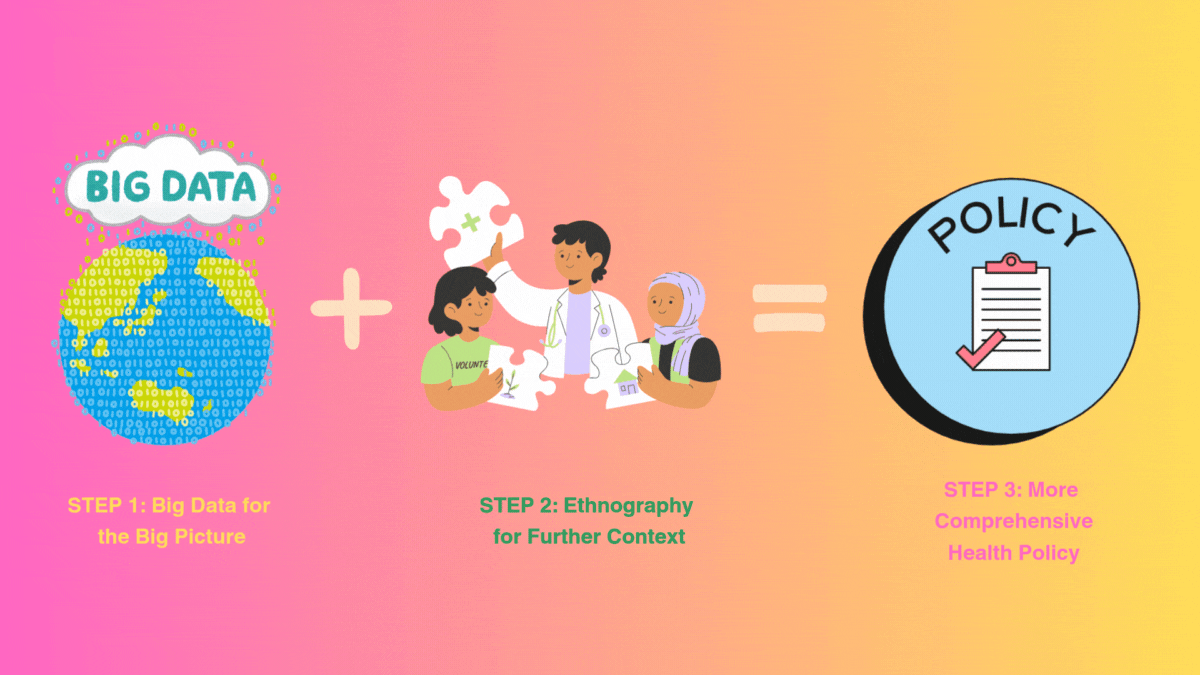Narratives Matter: Why Healthcare Needs More Than Numbers
Discover how ethnographic research can inform health policy decisions and help address key gaps in healthcare. Learn about the importance of evidence-based qualitative research.
In the world of healthcare policy, decisions often hinge on cold, hard data. But what if those numbers paint an incomplete picture? As Sara L M Davis incisively points out in her 2020 book The Uncounted: Politics of Data in Global Health, what gets counted — indeed who gets counted — is a political process. Big data has become the cornerstone of our modern social policy building and rarely tells a complete story. And the ones it usually misses are the ones that need the most help. This is where ethnography steps in, offering a powerful tool to craft more nuanced and effective health policies.
The Unspoken Needs in Healthcare
The call to integrate more qualitative data into healthcare policy isn't new. Doctors, researchers, and advocates regularly urge for a deeper understanding of patient experiences. Existing articles explore the strengths and limitations of including patient narratives alongside clinical data, emphasising the urgency of incorporating these stories into our healthcare systems [1, 3].
My argument aligns with this call to action. Ethnographic data can bridge some of the biggest gaps in healthcare policy. But simply adding a patient anecdote to a policy document isn't enough. It shouldn't be a formality. Before discussing how to best use ethnographic data, let's revisit the "why."
Why Patient Stories Matter
There are many ways to gather qualitative data. Ethnography, a research tool rooted in anthropology, goes beyond medical charts and delves into lived experiences. An ethnographer embeds themself in a community or healthcare setting to understand the social factors, cultural beliefs, and daily realities that influence health outcomes.
Some might argue that the complexities of ethnography clash with the need for clear-cut policy solutions [1]. However, Clemens and Tierney (2020) argue that ethnography is essential for ethical and socially just policy [1].
Here's why:
Challenging Stereotypes: Ethnography can expose biases in policy design and challenge negative stereotypes about certain populations such as homeless people and immigrants. [3]
Connecting the Micro and Macro: Ethnographic research can link individual experiences to larger social, political, and economic forces. [3]
Artful Advocacy: Ethnography can use storytelling to capture the reader's imagination and promote empathy for the experiences of others, including policymakers and advocates themselves. [1]
Empowering a Patient-Centred Approach
Here's why including ethnographic data in healthcare policymaking can make a world of difference:
Uncovering Hidden Barriers: Numbers can't tell you how a policy might affect a patient's ability to access care. Ethnography reveals unforeseen challenges, like transportation difficulties or cultural stigmas, that data might miss.
Context is King: Health policies often fail because they don't consider the specific social and cultural contexts that influence health behaviours. Ethnography provides that crucial context by understanding the community dynamics that shape how people manage their health.
Empowering Patients: Ethnography gives voice to the patients most impacted by healthcare policies. By including their perspectives, policymakers can create solutions that are truly responsive to patient needs and preferences.
Human-Centred Care: Effective health policy should be designed with patients in mind. Ethnography helps policymakers see the healthcare system through the eyes of those they are trying to help, leading to more patient-centred approaches.
Bridging the Gap Between Data and Reality
Ethnographic data isn't a replacement for traditional healthcare data, but rather a valuable complement. In a blog posted on 17 January 2020 for The Policy Lab, Dr Andrea Siodmok highlights this very point, differentiating between "big data" and "thick data" [2].
Big data, vast sets of digital information, offers a population-level view and identifies trends. However, it can be biased and lack context.
Thick data, gathered through ethnographic research, provides rich details about individual experiences and the emotional aspects of healthcare.
Dr Siodmok emphasises that the "sweet spot" for good policymaking lies in combining big data with thick data [2].
Incorporating patient stories through ethnography allows us to see healthcare through the patient's eyes. This, combined with traditional quantitative data, is a powerful step towards creating policies that empower patients, improve health outcomes, and promote social justice.
Sources:
[1] Randall F Clemens & William G Tierney, “The Role of Ethnography as Ethical and Policy-Relevant Public Scholarship,” Cultural Studies ↔ Critical Methodologies, June 29, 2020: https://doi.org/10.1177/1532708620936993
[2] Dr Andrea Siodmok, “Lab Long Read: Human-centred policy? Blending 'big data' and 'thick data' in national policy,” The Policy Lab, January 17, 2020: https://openpolicy.blog.gov.uk/2015/03/27/ethnography-in-policymaking/
[3] Anne N Sosin & Elizabeth A Carpenter-Song, “Reimagining Rural Health Equity: Understanding Disparities And Orienting Policy, Practice, And Research In Rural America,” Health Affairs (Volume 46, No. 6), June 2024, https://doi.org/10.1377/hlthaff.2024.00036
[4] Jan Savage, “Ethnography and health care,” BMJ (321), 20 September 2000, https://doi.org/10.1136/bmj.321.7273.1400




